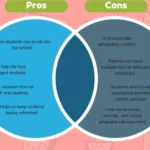As students, we’ve all had our fair share of homework assignments, and it’s no secret that opinions regarding their effectiveness vary greatly. While some students find homework to be a helpful tool for reinforcing learning and developing crucial skills, others view it as a source of stress and burnout. In this article, we’ll take a closer look at the pros and cons of homework, explore the potential impact on students’ mental health and academic outcomes, and provide tips for making homework more effective. Whether you’re a student, parent, or educator, this article will provide you with valuable insights into the ongoing debate surrounding homework.
Contents
Pros of Homework

Homework has many pros and cons, and it is essential to understand both sides of the debate. Pros of homework include reinforcing learning, developing time management and study skills, providing opportunities for parental involvement, and preparing students for college and future careers. Homework allows students to practice what they learned in class and helps them develop critical skills that will benefit them in the future. Additionally, it provides a way for parents to get involved in their child’s education and monitor their progress. By preparing students for college and future careers, homework sets them up for success in the long run. To make homework more effective, it is crucial to set clear goals and expectations, provide timely and relevant feedback, encourage collaboration and peer learning, and personalize assignments and allow for choice.
1. Reinforces Learning
Homework has long been seen as a way to reinforce learning that takes place in the classroom. When students complete homework assignments, they have the opportunity to review and practice what they have learned in class. This repetition can help to solidify concepts and improve understanding. Additionally, homework can introduce new concepts that will be covered in future lessons, giving students a head start on the material.
However, it’s important to note that homework should be used judiciously to reinforce learning. Assigning too much homework can lead to burnout and stress, which can actually impede learning. It’s important for teachers to strike a balance between reinforcing learning and overwhelming students with work.
To make homework more effective, teachers can provide timely feedback and personalized assignments that cater to each student’s strengths and weaknesses. By doing so, students can focus on the areas where they need the most help and feel more confident in their abilities. Teachers can also encourage collaboration and peer learning, giving students the opportunity to work together and learn from one another’s strengths.
Anchor text: Quizlet coupon code
2. Develops Time Management and Study Skills
Homework is often seen as a way to reinforce learning from the classroom, but it also has benefits beyond that. Completing homework assignments on time requires students to develop strong time management skills and study habits. By prioritizing assignments, students learn to allocate their time effectively, balance their workload, and avoid procrastination. These skills are essential not only for academic success but also for success in future careers. Homework also provides an opportunity for students to practice self-directed learning and take responsibility for their own education. By managing their own time and resources, students become more independent learners. To make the most of homework assignments, teachers can provide guidance on time management strategies and study techniques, such as breaking assignments into smaller, manageable tasks. Additionally, incorporating peer learning and group projects can help students develop collaboration and communication skills, which are also valuable in the workforce.
3. Provides Opportunities for Parental Involvement
Homework can be a great way for parents to get involved in their child’s education. When parents help their children with homework, they have a better understanding of what their child is learning, and they can offer support and guidance as needed. Additionally, homework can provide opportunities for parents to bond with their children and build stronger relationships.
One way that parents can get involved with homework is by setting up a designated homework space at home. This space should be quiet, well-lit, and free from distractions to help children focus on their work. Parents can also help their children create a homework schedule to ensure that they are completing their assignments on time.
Another way that parents can support their children with homework is by reviewing their work and offering feedback. This can help children to understand their mistakes and learn from them. Parents can also help their children to study for tests and quizzes by creating flashcards or using educational apps like Quizlet.
Homework provides a unique opportunity for parents to get involved in their children’s education. By working together, parents and children can create a positive learning environment that supports academic success.
4. Prepares Students for College and Future Careers
Homework is a critical component of academic success as it prepares students for college and future careers. The ability to manage time, prioritize tasks, and study effectively are essential skills that are honed through homework assignments. Students who consistently complete homework assignments are better equipped to manage their workload and meet deadlines, which are crucial skills for success in college and the workforce. Additionally, homework assignments can introduce students to new topics, encourage research and exploration, and help them develop critical thinking skills that are essential for success in any field. By developing these skills through homework assignments, students are better prepared to tackle the challenges of college and the workforce.
Cons of Homework

Homework is often seen as a necessary evil, but it’s not without its downsides. One of the biggest cons of homework is that it can negatively affect mental health. Studies have shown that excessive homework can lead to stress, anxiety, and even depression in students. Additionally, homework can lead to inequities and disadvantages, as some students may not have access to the resources they need to complete assignments at home. Overload and burnout can also be a problem, as students may have too many assignments to complete in a short amount of time. Finally, homework can limit exploration and creativity, as students may be too focused on completing assignments to explore their own interests and passions. While homework can be beneficial in many ways, it’s important to recognize these potential downsides and take steps to mitigate them.
1. Can Negatively Affect Mental Health
Homework can be a major source of stress and anxiety for students. The pressure to complete assignments on time, especially when coupled with other demands such as extracurricular activities or part-time jobs, can lead to feelings of overwhelm and burnout. In some cases, excessive homework can even contribute to mental health issues such as depression and anxiety. Research has shown that high levels of stress can lead to physical symptoms such as headaches and stomach problems, as well as emotional symptoms like irritability and mood swings.
Excessive homework can also lead to sleep deprivation, which is a critical component of overall mental health and wellness. Lack of sleep can affect a student’s ability to concentrate, retain information, and perform well on exams. It can also lead to more serious health problems such as obesity, diabetes, and heart disease.
While some students are able to manage homework without any negative effects, others are more vulnerable to the stress and pressure that it can create. It’s important for educators and parents to recognize the potential risks of excessive homework and to take steps to mitigate these risks, such as setting reasonable expectations and providing support and resources for students who may be struggling.
Link: /teaching-freebies/
2. Can Lead to Inequities and Disadvantages
One of the major downsides of homework is that it can lead to inequities and disadvantages. Students from lower socioeconomic backgrounds may not have access to the same resources as their more affluent peers, such as quiet study spaces or computers with internet access. This can put them at a disadvantage when it comes to completing homework assignments. Additionally, students who are not native English speakers or who have learning disabilities may struggle to understand the material or complete assignments on their own. This can lead to feelings of frustration and inadequacy, and may ultimately result in lower grades. The amount of homework assigned can vary widely between teachers and schools, leading to inconsistencies and discrepancies in learning outcomes. It is important to address these inequities and disadvantages by providing extra support and resources to students who need it, and by ensuring that homework assignments are fair and accessible to all students. One way to do this is to provide additional tutoring or after-school programs for students who may need extra help. Another way is to offer online resources or study materials that can be accessed from home, especially during the COVID-19 pandemic when many students are learning remotely. By addressing these issues, we can help ensure that homework is a fair and effective tool for learning.
3. Can Result in Overload and Burnout
Homework can easily become overwhelming and stressful for students, especially when they have multiple assignments due around the same time. This can lead to overload and burnout, which can negatively impact their mental health and academic performance. Students may feel anxious, exhausted, and unmotivated, which can make it difficult for them to complete their assignments effectively. Students who are already struggling with mental health issues may find it even harder to cope with the added stress of homework. It is important for educators to be aware of the potential for overload and burnout and to take steps to mitigate these risks. This can include setting realistic and manageable assignments, providing support and resources for students who are struggling, and encouraging self-care and stress-management techniques. By addressing the issue of overload and burnout, educators can help ensure that homework remains a valuable tool for learning and development rather than a source of stress and anxiety for students.
Internal link: Quizlet Plus student discount
4. Can Limit Exploration and Creativity
Homework assignments that require students to simply regurgitate information or follow a set of steps can limit their exploration and creativity. When students are given tasks that have a clear and specific answer, they may not have the opportunity to think outside the box or develop their problem-solving skills. This can lead to a lack of engagement and interest in the subject matter.
To combat this issue, educators can assign open-ended tasks that allow for more creativity and exploration. For example, instead of assigning a worksheet that requires students to list vocabulary words and their definitions, teachers can ask students to create a story that incorporates the vocabulary words. This allows students to use their imagination and develop their language skills in a more engaging way.
It’s also important for educators to encourage students to ask questions and pursue their own interests. By providing opportunities for self-directed learning, students can explore topics that are meaningful to them and develop a deeper understanding of the subject matter.
While homework can be a valuable tool for reinforcing learning and developing skills, it’s important for educators to be mindful of the potential limitations it can have on exploration and creativity. By providing open-ended tasks and encouraging self-directed learning, educators can help students develop a love of learning that will serve them well in the future.
How to Make Homework More Effective
To make homework more effective, it’s important for educators to set clear goals and expectations for their students. Providing timely and relevant feedback can also help students stay on track and improve their performance. Encouraging collaboration and peer learning can help students learn from each other and build important social skills. Finally, personalizing assignments and allowing for choice can help students stay engaged and motivated. By following these tips, educators can help make homework a valuable and effective tool for learning. For more information on educational resources, check out National Geographic Education.
1. Set Clear Goals and Expectations
Setting clear goals and expectations is an essential step in making homework more effective. When students know what is expected of them, they are more likely to stay focused and motivated. Teachers should clearly outline the purpose of each assignment and what they hope to accomplish through it. This can be done by providing a rubric or checklist that outlines the specific requirements for each task.
In addition to setting clear goals, teachers should also communicate their expectations for how the work should be done. This includes guidelines for formatting, citation, and plagiarism. By providing clear instructions, teachers can help students avoid confusion and frustration.
To further enhance the effectiveness of homework, teachers can also provide examples of high-quality work. This helps students to understand what is expected of them and provides a benchmark for their own work.
It’s important to note that setting clear goals and expectations does not mean micromanaging or dictating every aspect of the homework. Instead, it’s about providing students with the necessary guidance and support to help them succeed.
By setting clear goals and expectations, teachers can help students stay on track, avoid misunderstandings, and produce high-quality work. This can ultimately lead to greater academic success and a more positive attitude towards homework.
2. Provide Timely and Relevant Feedback
Providing timely and relevant feedback is an essential aspect of making homework effective. When students receive feedback on their homework promptly, they can identify their mistakes and better understand where they need to improve. Feedback should be personalized to each student’s needs and should highlight their strengths and weaknesses. A great way to provide feedback is through online tools like Google Classroom or ABCmouse for Teachers, which allows teachers to grade assignments and provide feedback quickly and efficiently. Relevant feedback also means that it is specific and related to the learning goals of the assignment. Teachers can use rubrics or checklists to ensure that feedback is consistent and objective. By providing timely and relevant feedback, students can feel more engaged with their learning and motivated to improve.
3. Encourage Collaboration and Peer Learning
Collaboration and peer learning can greatly enhance the effectiveness of homework. By working together, students can share their ideas and knowledge, learn from each other, and develop their social and communication skills. Teachers can encourage collaboration by assigning group projects or activities that require teamwork. They can also facilitate peer learning by pairing students of different abilities or backgrounds to work together on assignments. This can help create a supportive and inclusive learning environment where everyone can thrive. Teachers can use technology tools such as online discussion forums or video conferencing to connect students who are working remotely. This can help students feel less isolated and more engaged in their learning. By encouraging collaboration and peer learning, teachers can help students develop important skills that will serve them well beyond their homework assignments. Collaboration and peer learning are crucial components of effective education, and should be integrated into homework assignments whenever possible.
To further enhance the effectiveness of homework, teachers can use a variety of resources and tools. For example, they can use educational software such as ABCmouse for Teachers or National Geographic Education to create interactive and engaging assignments. They can also use puzzles or games such as money puzzles or ant farms to make learning fun and engaging. Teachers can use language learning software such as Rosetta Stone to help students develop their language skills. By using a variety of resources and tools, teachers can create homework assignments that are both effective and enjoyable.
4. Personalize Assignments and Allow for Choice
Personalizing assignments and allowing for choice can be an effective way to increase student engagement and motivation. By giving students the freedom to choose how they approach an assignment, they are more likely to take ownership of their learning and feel invested in the outcome. This can be especially important for students who may not feel as confident in certain subjects or who have different learning styles.
One way to personalize assignments is to offer options for how students can demonstrate their understanding of a topic. For example, instead of assigning a traditional written essay, students could have the option to create a visual presentation or record a podcast. This not only allows students to showcase their strengths and interests, but it also allows them to think creatively and critically about the material.
Another way to personalize assignments is to take into account students’ individual needs and interests. For example, if a student is particularly interested in a certain topic, they could be given the opportunity to explore it in more depth or apply it to a real-world scenario. Additionally, if a student is struggling with a particular concept, they could be given extra support and resources to help them succeed.
Personalizing assignments and allowing for choice can be a powerful tool for increasing student engagement and promoting a love of learning. By valuing students’ individual strengths and needs, we can create a more inclusive and effective learning environment.
If you want to learn more about the benefits of homework, you can visit our pros of homework page. Alternatively, if you are a teacher looking for engaging and interactive learning resources, you can check out our ABCmouse for Teachers platform.
Conclusion
In conclusion, homework is a topic of controversy with both pros and cons. While it is important in reinforcing learning and developing study skills, it can also negatively affect mental health, lead to inequities and burnout, and limit creativity. To make homework more effective, it is necessary to set clear goals and expectations, provide timely and relevant feedback, encourage collaboration and peer learning, and personalize assignments. It is important to strike a balance between assigning enough homework to reinforce learning and not overloading students. Ultimately, the effectiveness of homework depends on how it is assigned, managed, and evaluated. Therefore, educators, parents, and students should work together to optimize the benefits of homework while minimizing its drawbacks.
Frequently Asked Questions
FAQs
1. How much homework should a student have?
2. Can homework improve academic performance?
3. Should homework be graded?
4. How much parental involvement in homework is appropriate?
5. Does homework benefit high school students more than elementary school students?
6. Should homework be assigned on weekends and holidays?
7. How can teachers prevent cheating on homework?
8. Is it fair for teachers to assign homework over school breaks?
9. Should students be allowed to opt-out of homework?
10. How can homework assignments be made more relevant to students’ lives?







